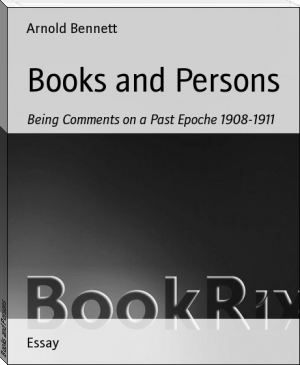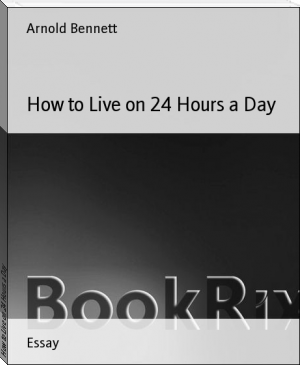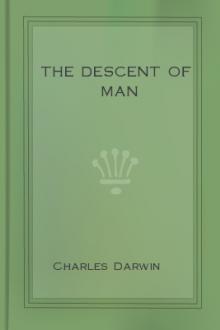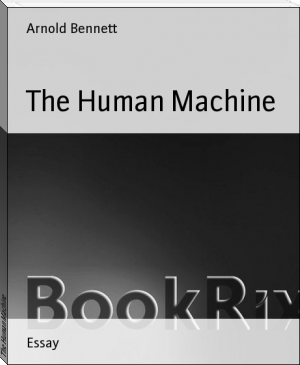Books and Persons - Arnold Bennett (phonics readers .TXT) 📗

- Author: Arnold Bennett
Book online «Books and Persons - Arnold Bennett (phonics readers .TXT) 📗». Author Arnold Bennett
designed by an all-merciful providence for this purpose. Mr. Scott-James has undoubted gifts as a critic, and his temperament is sympathetic; and the men most capable of appreciating him, and whose appreciation he would probably like to retain, would esteem him even more highly if he could get into his head the simple fact that a novel is a novel. I have suffered myself from this very provincial mania for chemically testing novels for traces of autobiography. There are some critics of fiction who talk about autobiography in fiction in the tone of a doctor who has found arsenic in the stomach at a post-mortem inquiry. The truth is that whenever a scene in a novel is _really_ convincing, a certain type of critical and uncreative mind will infallibly mutter in accents of pain, "Autobiography!" When I was discussing this topic the other day a novelist not inferior to Mr. Wells suddenly exclaimed: "I say! Supposing we _did_ write autobiography!"... Yes, if we did, what a celestial rumpus there would be!
* * * * *
The carping at "The New Machiavelli" is naught. For myself I anticipated for it a vast deal more carping than it has in fact occasioned. And I am very content to observe a marked increase of generosity in the reception of Mr. Wells's work. To me the welcome accorded to his best books has always seemed to lack spontaneity, to be characterized by a mean reluctance. And yet if there is a novelist writing to-day who by generosity has deserved generosity, that novelist is H.G. Wells. Astounding width of observation; a marvellously true perspective; an extraordinary grasp of the real significance of innumerable phenomena utterly diverse; profound emotional power; dazzling verbal skill: these are qualities which Mr. Wells indubitably has. But the qualities which consecrate these other qualities are his priceless and total sincerity, and the splendid human generosity which colours that sincerity. What above all else we want in this island of intellectual dishonesty is some one who will tell us the truth "and chance it." H.G. Wells is pre-eminently that man. He might have told us the truth with cynicism; he might have told it meanly; he might have told it tediously--and he would still have been invaluable. But it does just happen that he has combined a disconcerting and entrancing candour with a warmth of generosity towards mankind and an inspiring faith in mankind such as no other living writer, not even the most sentimental, has surpassed. And yet in the immediate past we have heard journalists pronouncing coldly: "This thing is not so bad." And we have heard journalists asserting in tones of shocked reprehension: "This thing is not free from faults!" Who the deuce said it was free from faults? But where in fiction, ancient or modern, will you find another philosophical picture of a whole epoch and society as brilliant and as honest as "The New Machiavelli"? Well, I will tell you where you will find it. You will find it in "Tono-Bungay." H.G. Wells is a bit of sheer luck for England. Some countries don't know their luck. And as I do not believe that England is worse than another, I will say that no country knows its luck. However, as regards this particular bit, there are now some clear signs of a growing perception.
* * * * *
The social and political questions raised in "The New Machiavelli" might be discussed at length with great advantage. But this province is not mine. Nor could the rightness or the wrongness of the hero's views and acts affect the artistic value of the novel. On purely artistic grounds the novel might be criticized in several ways unfavourably. But in my opinion it has only one fault that to any appreciable extent impairs its artistic worth. The politically-creative part, as distinguished from the politically-shattering part, is not convincing. The hero's change of party, and his popular success with the policy of the endowment of motherhood are indeed strangely unconvincing--inconceivable to common sense. Here the author's hand has trembled, and his persuasive power forsaken him. Happily he recaptured it for the final catastrophe, which is absolutely magnificent, a masterpiece of unforced poignant tragedy and unsentimental tenderness.
SUCCESS IN JOURNALISM
[_16 Feb. '11_]
It is notorious that in London--happily so different from other capitals--there is no connexion between the advertisement and the editorial departments of the daily papers. It is positively known, for instance, that the exuberant editorial praise poured out upon the new "Encyclopaedia Britannica" has no connexion whatever with the tremendous sums paid by the Cambridge University Press for advertising the said work of reference. The almost simultaneous appearance, of the advertisements and of the superlative reviews is a pure coincidence. Now, in Paris it would not be a coincidence, and nobody would have the courage to pretend that it was. But London is a city apart. In view of this admitted fact I was intensely startled, not to say outraged, by a conversation at which I assisted the other day. A young acquaintance, with literary and journalistic proclivities, and with a touching belief in the high mission of the London press, desired advice as to the best method of reaching the top rungs of the ladder of which he had not yet set foot even on the lowest rung. I therefore invited him to meet a celebrated friend of mine, an author and a journalist, who has recently quitted an important editorial chair.
* * * * *
The latter spoke to him as follows: "My dear boy, you had better get a situation in the advertisement department of a paper--no matter what paper, provided it has a large advertisement revenue; and no matter what situation, however modest." Here the youth interrupted with the remark that his desire was the editorial department. The ex-editor proceeded calmly: "I have quite grasped that.... Well, you must work yourself up in the advertisement department! What you chiefly require for success is a good suit, a good club, an imperturbable manner, and a cultivated taste in restaurants and bars. In your spare time you must write long dull articles for the reviews; and you must rediscover London in a series of snappish sketches for a half-penny daily, and also write a novel that is just true enough to frighten the libraries and not too true to make them refuse it altogether: it must absolutely be such a novel as they will supply only to such subscribers as insist on having it. When you have worked your way very high up in the advertisement department, and are intimate with advertisement agents and large advertisers to the point of being able to influence advertisements amounting to fifty thousand pounds a year--then, and not before, you may look about you and decide what big serious daily paper you would like to assist in editing. Make your own choice. Then see the proprietor. If he is not already in the House of Lords, he will assuredly be on Mr. Asquith's private list of five hundred candidates for the House of Lords. The best moment to catch him is as he comes out of the Palace Theatre, about a quarter past eleven of a night. Tell him on the pavement that you have edited a paper in Chicago, and he will at once invite you into his automobile. You go with him to his club, and then you confess that you have not edited a paper in Chicago, but that you have adopted this device in order to get speech with him, and that all you desire is a humble post on the editorial staff of his big serious daily.
* * * * *
"He will insult you. He will inform you that he has forty candidates for the most insignificant post on the editorial staff, and that there is not the remotest chance for you. You then tell him that you are an expert writer, a contributor to the monthlies and quarterlies, and the author of a novel which Mr. James Douglas has described as the most stupendously virile work of fiction since Tourgeniev's 'Crime and Punishment.' He will insult you anew, and demand your immediate departure. You then say to him, in a casual tone: 'I can bring you ten thousand pounds' worth of ads. a year.' He will read your deepest soul with one glance, and will reply, in a casual tone, 'I dare say I could find you something regular to do on the magazine page.' You go on airily: 'I'm pretty sure I can bring twenty thousand pounds' worth of ads. a year.' He will then order R.P. Muria cigars, and say with benevolence: 'It just happens that the head of our reviewing department is under notice. How would that suit you?' You then unmask all your batteries, and tell him squarely that you can bring him advertisements to the tune of a thousand pounds a week. Whereupon he will reply, shaking you fraternally by the hand: 'My dear fellow, I will make you editor at once.'"
* * * * *
So spake my celebrated friend. Of course, he is a cynic. He may be a criminal cynic. But he spake so. From time to time London dailies do me the honour to reprint saucy paragraphs from this weekly article of mine. My friend said to me: "You can print what I've said, if you like. No daily paper in London will reprint _that_."
MARGUERITE AUDOUX
[_2 March '11_]
Among the astonishing phenomena of a spring season which promises to be quite as successful, in its way, as the very glorious autumn season (publishers must have spent a happy Christmas!) is the success of a really distinguished book. I mean "Marie Claire." Frankly, I did not anticipate this triumph. For, of course, it is very difficult for an author of experience to believe that a good book will be well received. However, "Marie Claire" has been helped by a series of extraordinary reviews. No novel of recent years has had such favourable reviews, or so many of them, or such long ones. I have seen all of them--all except one have been very laudatory--and I am in a position to state that if placed end to end they would stretch from Miss Corelli's house in Stratford-on-Avon across the main to Mr. Hall Caine's castle in the Isle of Man. This may be called praise. One of the best, if not the best, was signed "J.L.G." in the _Observer_. It is indeed a solemn and terrifying thought that Mr. Garvin, who, by means of thoroughly bad prose persisted in during many years, has at last laid the Tory Party in ruins, should be so excellent a judge of literature. Mr. Garvin made his debut in the London Press, I think, as a literary critic; and it is a pity (from
* * * * *
The carping at "The New Machiavelli" is naught. For myself I anticipated for it a vast deal more carping than it has in fact occasioned. And I am very content to observe a marked increase of generosity in the reception of Mr. Wells's work. To me the welcome accorded to his best books has always seemed to lack spontaneity, to be characterized by a mean reluctance. And yet if there is a novelist writing to-day who by generosity has deserved generosity, that novelist is H.G. Wells. Astounding width of observation; a marvellously true perspective; an extraordinary grasp of the real significance of innumerable phenomena utterly diverse; profound emotional power; dazzling verbal skill: these are qualities which Mr. Wells indubitably has. But the qualities which consecrate these other qualities are his priceless and total sincerity, and the splendid human generosity which colours that sincerity. What above all else we want in this island of intellectual dishonesty is some one who will tell us the truth "and chance it." H.G. Wells is pre-eminently that man. He might have told us the truth with cynicism; he might have told it meanly; he might have told it tediously--and he would still have been invaluable. But it does just happen that he has combined a disconcerting and entrancing candour with a warmth of generosity towards mankind and an inspiring faith in mankind such as no other living writer, not even the most sentimental, has surpassed. And yet in the immediate past we have heard journalists pronouncing coldly: "This thing is not so bad." And we have heard journalists asserting in tones of shocked reprehension: "This thing is not free from faults!" Who the deuce said it was free from faults? But where in fiction, ancient or modern, will you find another philosophical picture of a whole epoch and society as brilliant and as honest as "The New Machiavelli"? Well, I will tell you where you will find it. You will find it in "Tono-Bungay." H.G. Wells is a bit of sheer luck for England. Some countries don't know their luck. And as I do not believe that England is worse than another, I will say that no country knows its luck. However, as regards this particular bit, there are now some clear signs of a growing perception.
* * * * *
The social and political questions raised in "The New Machiavelli" might be discussed at length with great advantage. But this province is not mine. Nor could the rightness or the wrongness of the hero's views and acts affect the artistic value of the novel. On purely artistic grounds the novel might be criticized in several ways unfavourably. But in my opinion it has only one fault that to any appreciable extent impairs its artistic worth. The politically-creative part, as distinguished from the politically-shattering part, is not convincing. The hero's change of party, and his popular success with the policy of the endowment of motherhood are indeed strangely unconvincing--inconceivable to common sense. Here the author's hand has trembled, and his persuasive power forsaken him. Happily he recaptured it for the final catastrophe, which is absolutely magnificent, a masterpiece of unforced poignant tragedy and unsentimental tenderness.
SUCCESS IN JOURNALISM
[_16 Feb. '11_]
It is notorious that in London--happily so different from other capitals--there is no connexion between the advertisement and the editorial departments of the daily papers. It is positively known, for instance, that the exuberant editorial praise poured out upon the new "Encyclopaedia Britannica" has no connexion whatever with the tremendous sums paid by the Cambridge University Press for advertising the said work of reference. The almost simultaneous appearance, of the advertisements and of the superlative reviews is a pure coincidence. Now, in Paris it would not be a coincidence, and nobody would have the courage to pretend that it was. But London is a city apart. In view of this admitted fact I was intensely startled, not to say outraged, by a conversation at which I assisted the other day. A young acquaintance, with literary and journalistic proclivities, and with a touching belief in the high mission of the London press, desired advice as to the best method of reaching the top rungs of the ladder of which he had not yet set foot even on the lowest rung. I therefore invited him to meet a celebrated friend of mine, an author and a journalist, who has recently quitted an important editorial chair.
* * * * *
The latter spoke to him as follows: "My dear boy, you had better get a situation in the advertisement department of a paper--no matter what paper, provided it has a large advertisement revenue; and no matter what situation, however modest." Here the youth interrupted with the remark that his desire was the editorial department. The ex-editor proceeded calmly: "I have quite grasped that.... Well, you must work yourself up in the advertisement department! What you chiefly require for success is a good suit, a good club, an imperturbable manner, and a cultivated taste in restaurants and bars. In your spare time you must write long dull articles for the reviews; and you must rediscover London in a series of snappish sketches for a half-penny daily, and also write a novel that is just true enough to frighten the libraries and not too true to make them refuse it altogether: it must absolutely be such a novel as they will supply only to such subscribers as insist on having it. When you have worked your way very high up in the advertisement department, and are intimate with advertisement agents and large advertisers to the point of being able to influence advertisements amounting to fifty thousand pounds a year--then, and not before, you may look about you and decide what big serious daily paper you would like to assist in editing. Make your own choice. Then see the proprietor. If he is not already in the House of Lords, he will assuredly be on Mr. Asquith's private list of five hundred candidates for the House of Lords. The best moment to catch him is as he comes out of the Palace Theatre, about a quarter past eleven of a night. Tell him on the pavement that you have edited a paper in Chicago, and he will at once invite you into his automobile. You go with him to his club, and then you confess that you have not edited a paper in Chicago, but that you have adopted this device in order to get speech with him, and that all you desire is a humble post on the editorial staff of his big serious daily.
* * * * *
"He will insult you. He will inform you that he has forty candidates for the most insignificant post on the editorial staff, and that there is not the remotest chance for you. You then tell him that you are an expert writer, a contributor to the monthlies and quarterlies, and the author of a novel which Mr. James Douglas has described as the most stupendously virile work of fiction since Tourgeniev's 'Crime and Punishment.' He will insult you anew, and demand your immediate departure. You then say to him, in a casual tone: 'I can bring you ten thousand pounds' worth of ads. a year.' He will read your deepest soul with one glance, and will reply, in a casual tone, 'I dare say I could find you something regular to do on the magazine page.' You go on airily: 'I'm pretty sure I can bring twenty thousand pounds' worth of ads. a year.' He will then order R.P. Muria cigars, and say with benevolence: 'It just happens that the head of our reviewing department is under notice. How would that suit you?' You then unmask all your batteries, and tell him squarely that you can bring him advertisements to the tune of a thousand pounds a week. Whereupon he will reply, shaking you fraternally by the hand: 'My dear fellow, I will make you editor at once.'"
* * * * *
So spake my celebrated friend. Of course, he is a cynic. He may be a criminal cynic. But he spake so. From time to time London dailies do me the honour to reprint saucy paragraphs from this weekly article of mine. My friend said to me: "You can print what I've said, if you like. No daily paper in London will reprint _that_."
MARGUERITE AUDOUX
[_2 March '11_]
Among the astonishing phenomena of a spring season which promises to be quite as successful, in its way, as the very glorious autumn season (publishers must have spent a happy Christmas!) is the success of a really distinguished book. I mean "Marie Claire." Frankly, I did not anticipate this triumph. For, of course, it is very difficult for an author of experience to believe that a good book will be well received. However, "Marie Claire" has been helped by a series of extraordinary reviews. No novel of recent years has had such favourable reviews, or so many of them, or such long ones. I have seen all of them--all except one have been very laudatory--and I am in a position to state that if placed end to end they would stretch from Miss Corelli's house in Stratford-on-Avon across the main to Mr. Hall Caine's castle in the Isle of Man. This may be called praise. One of the best, if not the best, was signed "J.L.G." in the _Observer_. It is indeed a solemn and terrifying thought that Mr. Garvin, who, by means of thoroughly bad prose persisted in during many years, has at last laid the Tory Party in ruins, should be so excellent a judge of literature. Mr. Garvin made his debut in the London Press, I think, as a literary critic; and it is a pity (from
Free e-book «Books and Persons - Arnold Bennett (phonics readers .TXT) 📗» - read online now
Similar e-books:





Comments (0)